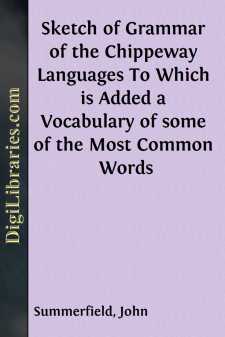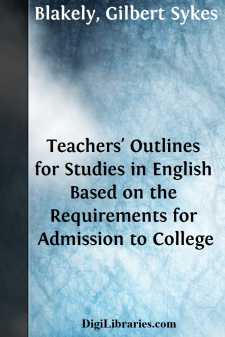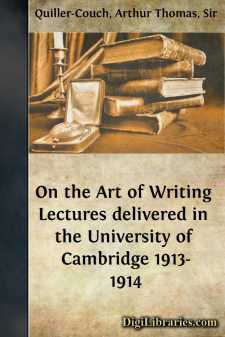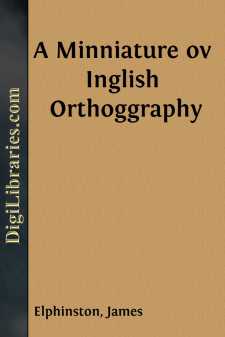Language Arts & Disciplines
Language Arts & Disciplines Books
Sort by:
by:
John Hartley
Or the Cottage on the Hill. A Christmas Story. CHAPTER I. The last strain of the grand old Christmas hymn had just been warbled forth from the throats and hearts of a number of happy folks, who were seated around the blazing log one Christmas eve; and on the face of each one of that family circle the cheering light revealed the look of happiness; the young—happy in the present, and indulging in...
more...
by:
John Summerfield
ADVERTISEMENT. The following pages were written as an exercise for my leisure hours, while attending the Oneida Conference Seminary during the past winter. As it is the first attempt that, to my knowledge, has ever been made to reduce the Chippeway language to any system, it cannot be expected to be otherwise than imperfect, and perhaps may hereafter be found to be, in some respects, erroneous. It is,...
more...
I. THE TEACHING OF THE NOVEL All will agree that the novel is one of the most important forms of literature for high school study. The fact that almost every boy and girl who is at all interested in reading likes the novel, gives the teacher an excellent opportunity to stimulate the pupil's love for literature and to help him to discriminate between what is true and what is false; between what is...
more...
Introductory The appended to this volume is (with the exception of the red lines and red lettering upon it) a reproduction of a portion of the map relating to the explorations and surveys of Dr. Strong, Mr. Monckton and Captain Barton, which was published in theGeographical Journalfor September, 1908, and the use of which has been kindly permitted me by the Royal Geographical Society. I have eliminated...
more...
I.—THE PROCESS BY COMBINATION. Two or more words may be united to form a new one, or to perform the office of a new one, and four methods or stages of combination may be noted. a. By juxtaposition, where the two words are placed together and yet remain as distinct words. This method is illustrated in Chinese, where the words in the combination when taken alone seldom give a clew to their meaning when...
more...
LECTURE I. INAUGURAL Wednesday, January 29, 1913 In all the long quarrel set between philosophy and poetry I know of nothing finer, as of nothing more pathetically hopeless, than Plato's return upon himself in his last dialogue 'The Laws.' There are who find that dialogue (left unrevised) insufferably dull, as no doubt it is without form and garrulous. But I think they will read it with...
more...
by:
Buckingham Smith
PART I: ORTHOGRAPHY. It has been thought proper to use nineteen characters in the language, among which are not included f, j, k, w, x, y, nor l, although the sound of l is somewhat heard in the soft enunciation given by the Indian to the letter r. The k is sufficiently supplied in the syllabic sounds que and qui, where the u is silent, although gue and gui are each of two syllables. There has been a...
more...
by:
James Elphinston
1. INTRODUCTION. Hwen evvery oddher language, and at last our own, haz been reduced to' science; rendered accountabel to' natives, and accessibel to' straingers; hwence iz it, dhat our practice, growing daily more a contrast dhan an exemplificacion ov our theory, tempts ignorance to' speak, az blind habbit spels; raddher dhan to' dream ov spelling, az propriety exhibbits her...
more...
INTRODUCTION The articles here presented are modern and unhackneyed. Selected primarily as models for teaching the methods of exposition employed in the explanation of mechanisms, processes, and ideas, they are nevertheless sufficiently representative of certain tendencies in science to be of intrinsic value. Indeed, each author is a recognized authority. Another feature is worthy of mention. Although...
more...
CHAPTER I ABOUT NOSES AND JAWS A foxhound scents the trail of his game and tracks it straight to a killing. A lapdog lacks this capability. In the same way, there are breeds of would-be writers who never can acquire a "nose for news," and others who, from the first day that they set foot in editorial rooms, are hot on the trail that leads to billboard headlines on the front page of a newspaper...
more...











